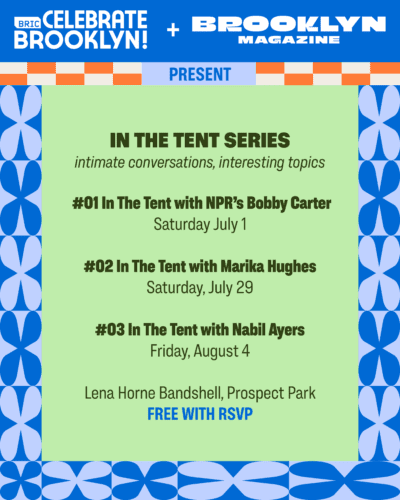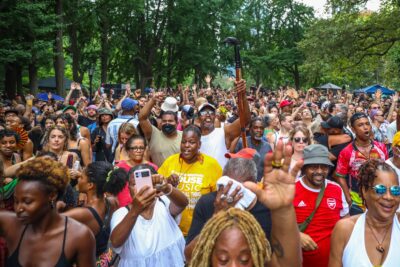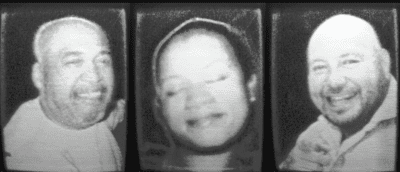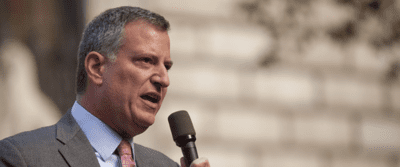Rev. Vince Anderson and filmmaker Nick Canfield discuss making ‘The Reverend’
'I've tried to get done with this God shit for a long time,' Anderson, the subject of a new documentary, tells Brooklyn Magazine
Like what you’re hearing? Subscribe to us at iTunes, check us out on Spotify and hear us on Google, Amazon, Stitcher and TuneIn. This is our RSS feed. Tell a friend!
For nearly a quarter century now, if you were to walk into the Williamsburg bar Union Pool on any given Monday, you’d be going to church.
There, in the back room, you will find Reverend Vince Anderson, conducting a sweaty sermon in sound with his Love Choir, backed by a heavy drumbeat, juicy horns, and soulful guitar licks. Anderson, resplendent in caftans, pounds on keys, howls and wails — a zaftig Tom Waits speaking in tongues and urging his crowd to join him in song.
If you haven’t been to Union Pool or are unable to make the Monday pilgrimage, now you can see him on the big screen. Anderson is the subject of a moving and inspirational new documentary called “The Reverend” by Nick Canfield.
Brooklyn Magazine recently sat down with both Anderson and Canfield at Nitehawk Cinema’s Prospect Park location at a special screening of “The Reverend.” He discussed his unique brand of spirituality and his “dirty gospel,” his grassroots activism and his influences.
This week’s episode of “Brooklyn Magazine: The Podcast” is a live recording of our interview. You can hear it wherever you get your podcasts. The following is a transcript of the conversation, lightly edited for clarity and flow.
I’ve done a lot of interviews. Never have I done one where we run the risk of someone taking off all their clothes in the middle of the performance. This could be a first. I’ve been to your shows at Union Pool. You’re in the moment. You’re feeling the spirit. I wonder if you can connect spirituality with that, the creation of music, the spontaneous creation of music and the spiritual realm.
Reverend Vince Anderson: Well, start with a hard question. For me, music is the language of the divine and of the cosmos and whatever the thing about God is that it’s called faith. So I don’t know what the fuck it is. That’s the whole thing of faith is that you don’t know. It’s this mystery that we try to put words to and words usually fail, but music gets the closest possible to try to express that mystery.
I would imagine there’s a communication with the unknown at some level.
Anderson: To use church language, we get on stage and we try to make sure the holy spirit comes and visits us in some way, shape or form. That’s what we’re inviting, and that’s what we’re welcoming.
You weren’t jazzed on this project, it sounds like this wasn’t something that you wanted necessarily to do. But [you said before the film that] stories are redemption. Talk about not wanting to do this and talk about redemption through storytelling. How did you need redemption?
Anderson: Over the years, I’ve had lots of filmmakers come and approach me and start filming and it never turned out or they were real…
Finish that sentence.
Anderson: One was shot, and they followed us on tour and the tour started on September 10th, 2001. That failed, that didn’t work out. Then just the idea of no one really having the follow through and you spend a lot of time giving your life to somebody. I was kind of burned out by these types, this guy over here, not this guy particularly. I do believe in stories. I do believe that stories are redemption in the sense that, in just the idea of being redeemed, that there’s value to your life. No matter how fucked up your life is, if you tell that story, there’s something redeeming about that. If you listen to people’s stories, you’ll find that there’s value in that story, even if it’s someone that you really don’t like.
Nick, obviously you have a very compelling subject in Vince. What made you want to make this movie in the first place? What was the moment where you’re like “This is a film?”
Nick Canfield: Well, I was just a fan. I’d been going to see Vince play for six or seven years before I decided that “What goes on behind the curtain?” I want to know literally what’s it back there behind the curtain. Then when you see it, he’s back there taking his clothes off. You can tell that Vince is a connection with the audience and with people. It’s a spiritual experience that people are having in a bar in the middle of the night, on Monday night, which is not a place that people usually have a spiritual experience. I wanted to explore what else he was doing and what he was like as a person and how much of himself we kind of get to see on stage. I think we learned that it’s him that we see on stage, but there’s a whole bunch more that we don’t get to see right away.
Deeper layers. You are, at least in this case, a very observant, observational filmmaker. You don’t interject at all, which I actually find really refreshing. Did you have a sense of the narrative at all before you started? “What’s the story I’m going to tell?” Or you’re just like “Let’s go in and see what happens.” Five years is a big commitment. Did you know how long it was going to take?
Canfield: I did not have any sense of the story going in. That’s kind of the intention behind observational filmmaking. I come from that school. I used to work for Albert Maysles. The Maysles brothers kind of created cinema verite, what we call observational filmmaking back in the ‘50s. You go in without a story, without an agenda, and you kind of let the story reveal itself to you. Let it tell you what it’s going to be.
Is the challenge there how do you know when you’re done?
Canfield: Yes, that’s absolutely the challenge. I didn’t even know that it was a feature. I didn’t know what the story arc would be. Initially I wanted to include way more of Vince on stage and have it be even more music. I realized that no one’s going to sit through that, really. It’s too much music. As much as that sounds great to us now. Try it. I’ve seen that film. Let me tell you, I cut that film. I cut that film first. It’s three hours long and no one’s watching it except me and Vince, I guess. We get to see a lot of other parts of Vince but I didn’t know when it was going to end or how it was going to end. I had gotten sort of what I thought the story was, but I didn’t know what the ending was and I’d just started the editing process. That’s when Vince went to El Paso to film at the memorial. Then when I filmed that I knew I had the ending.
How would you describe you, Vince? How would you describe the Vince of today compared to the Reverend Vince who first showed up at Union Pool 20 years ago?
Anderson: That version of me was still really pissed off at God or whatever. I’ve always had to qualify that with “whatever the thing we call God is,” because it is a mystery. It’s no definitive thing. The word doesn’t fit, but I was pissed off. I believe that God had called me 2,500 miles or whatever it is from California to New York and then said “We’re done.” For those first years I was really pissed. I gave up everything I had to move here. There was an anger in me and kind of a punk drunkenness. It was also, let’s face it. It was the mid-’90s in New York. I had just dropped out a seminary. Fill in the blanks. I was liberated in many ways. I think coming to terms with that and finally realizing that of all the people I was hanging out with in that period were the ones I wanted to minister to in the first place. Now I’m real comfortable with that, but it took me a long fucking time to get there.
Where does that impulse to minister come from?
Anderson: Oh, who knows? I think it comes from music. There’s nothing more gospel than music. If the word “gospel” means truth, then when you’re just sitting around, my family used to sing together all the time. The only thing to minister is love. Period. I’m hoping you’re all ministers here because that’s what the job is to minister to the existence and the frailty of love and what we have to do to make sure that that exists in the world and never gets put away.
In the movie, I thought was very powerful when you talk about “The Last temptation of Christ,” and you cross the picket line of nuns and you love the Jesus that was depicted in that movie. This was also around the same time, the one of the few times you heard God’s voice speak to you, was to say “We’re done.” What made you not done with God?
Anderson: I’ve tried to get done with this God shit for a long time. For me, it is real. It isn’t something I can put away. I’ll be 52 in a few weeks and it’s stayed with me. That challenge of where’s the line between this world that we’re in and whatever else is out there. This kind of liminal zone. I feel really comfortable in it.
Nick, This was your first film. What’s next?
Canfield: Well, this took over four years without the pandemic. I thought I would try something a little bit narrower in scope. I am working on a couple of short documentaries. I thought I would try something the exact opposite. This is about one song. You know it from the ‘80s. It’s an ‘90s one hit wonder song. It’s about [the song] from “Ferris Bueller’s Day Off.” “Oh Yeah” by Yello. It’s a Swiss electronic duo who just celebrated their 40th anniversary. I was in Zurich earlier this year. If anybody knows Matthew Broderick, I’m trying to interview him.
Can you give us any tasty tidbits?
Canfield: They’re pretty weird. They’re very Swiss. It’s not as lustful as you think it would be, but they’re weird for Swiss people.
Turns out the song’s about cheese? There’s not much in the film about your own musical influences [in the film] unless I missed it. Although you are wearing at one point a sweet Staple Singers shirt. Who inspired you musically, what was the call to music?
What was the first song you remember obsessing over?
Anderson: Well, it was always Johnny Cash right at the beginning. My mom, is a big Johnny Cash fan. June Carter was my first crush. My mom tells me stories of me trying to find “Live At San Quentin” and playing that when I was three or four. I wouldn’t be here if it wasn’t for Johnny Cash, because he enabled this to be able to talk about, and sing about humanity and religion and all these things in a seamless fashion that I don’t think anybody has done better than Johnny Cash.
Are there any questions you haven’t been able to ask one another yet?
Anderson: I think I’ve asked him all the questions. Is there going to be a sequel?
Canfield: Actually I think maybe. What I would do is something totally different. I just think it would be fun if we just did “Rev’s Restaurant Reviews” and you just go out to restaurants around Brooklyn and it’s not even a review. You just order a bunch of food and say what’s good and just tell people what to order.
Nick, how about you?
Canfield: I guess my question for you is I had a vague sense of what I thought might happen. You had probably no sense. Now that the film is out, how is it different than what you expected? Not the film itself, the experience of being out.
Anderson: I was pretty pessimistic about it and I thought it was going to go straight to DVD. I never thought that it would have audiences and that we’d be able to travel around and win some awards. Really seeing the film — I’ve seen it 35 fucking times or whatever now — it’s great to see it with the audience because you all respond to different things and I notice different things. Every time, seeing it with an audience is kind of an education about my own performance, about my own life and how I can do things. If you get a chance to get a documentary made about you, don’t hesitate. Go ahead and just say “We’ll do it.”
What’s new at Bushwick Abbey? Anything to report on that front? The work you’re doing with the kids is pretty incredible.
Anderson: Right now the main work with Bushwick Abbey is that we have a community fridge that [my wife] Milicent helps supply a lot of food to. If you ever need food, Tuesdays, Wednesdays and Thursdays are good days. You just come to 176 St. Nicholas and we’ll get you food. If you own a restaurant, you want to drop some food off …
I think we have a little more time than I thought. I just got the sign from John over here. I can open it up to questions. Please make it be a question, not a statement, comment or observation. We have one in the back. Yes, you sir.
Audience member: After unsuccessful experiences with other filmmakers, how was trust built early between the two of you?
Canfield: I guess I would say if you’re making a documentary, the first piece of advice I would give you would be to get drunk with your subjects. Even that takes time. It all takes time. You have to just be yourself and be honest and be there. You have to be there a lot, and you have to get people used to you being there, which is not always comfortable. Sometimes they’re in the bathroom and stuff like that, and you’re still there. It took Vince a good year, year and a half to really open up to me. You just have to just show yourself and be there and let people know who you are and build trust. Then the other way is I didn’t ask Vince to sign a release for quite a few years. I intentionally gave him the ability to tank the entire project.
Anderson: I think that’s right. For me, it was the same thing. When Nick started showing up at the shows every Monday, after a year of doing that, I trusted him. It took a while, but I think that, that was like “Hey, I’ve done this a lot longer than you. If you are willing to commit to doing it for a quarter of what I’ve been doing, then I think we’re good.”
I see another hand in the back row that went up first. Yes, you sir in the middle.
Audience member: Was Monday night your choice or was that what Union Pool gave you?
Anderson: I originally started on Sundays and that was the original nigh. Then when I moved to Union Pool, they had a really popular night, Brazilian beat, on Sunday. And then I realized “Wow, Monday is so much better. I’m not as tired,” because I still do church on Sunday. That was really what it was and I also liked the idea of starting the week off with something like this. Also I think taking it away from the Sunday vibe made it available for everybody. Now it can be whatever people want it to be.
Last thing, can either of you shout out a Brooklyn spot or restaurant or venue or band, anything local that you want people to know about?
Canfield: Oh man. I guess Wild Birds is about to close, you can go there. Come back to Union Pool. It’s nice to see people starting to come back. You know what I mean? It was a spot for late night and it started getting a little eerily quiet after 2 a.m., which felt weird to me. Come out late to Union Pool.
There was a fire, their back post fire. Cool. I think that’s all we got time for unless you want to do one shout out.
Anderson: I mean, Crest Hardware.
Check out this episode of “Brooklyn Magazine: The Podcast” for more. Subscribe and listen wherever you get your podcasts.
You might also like 


























